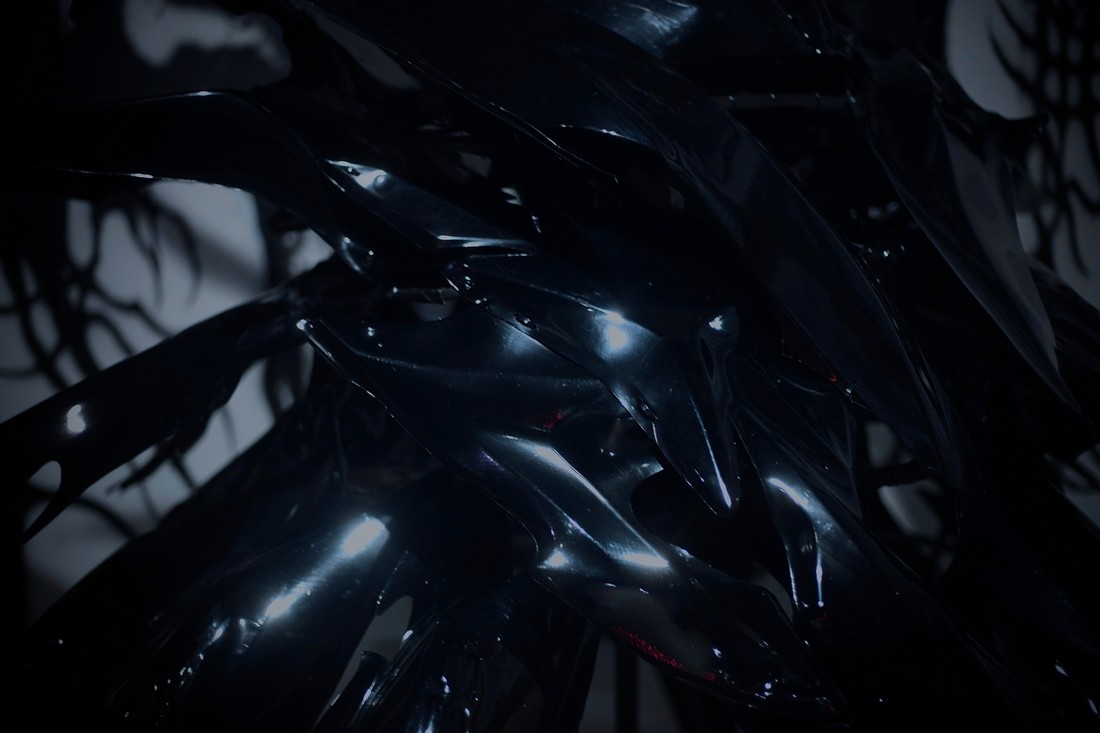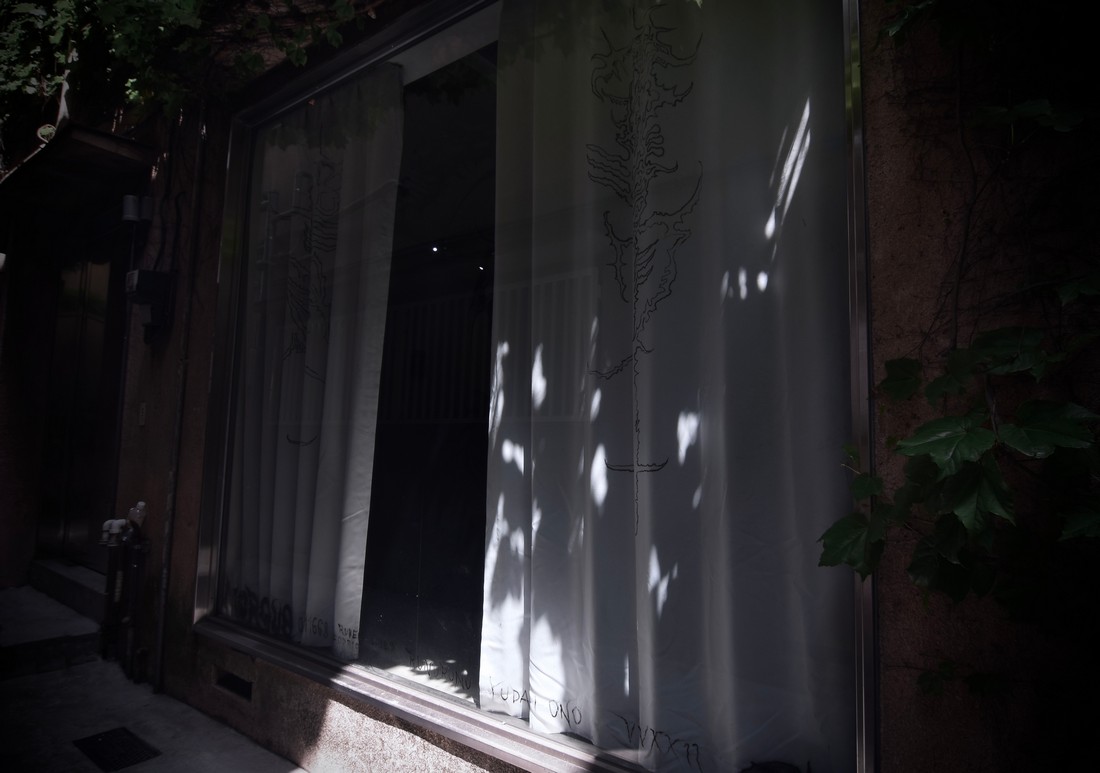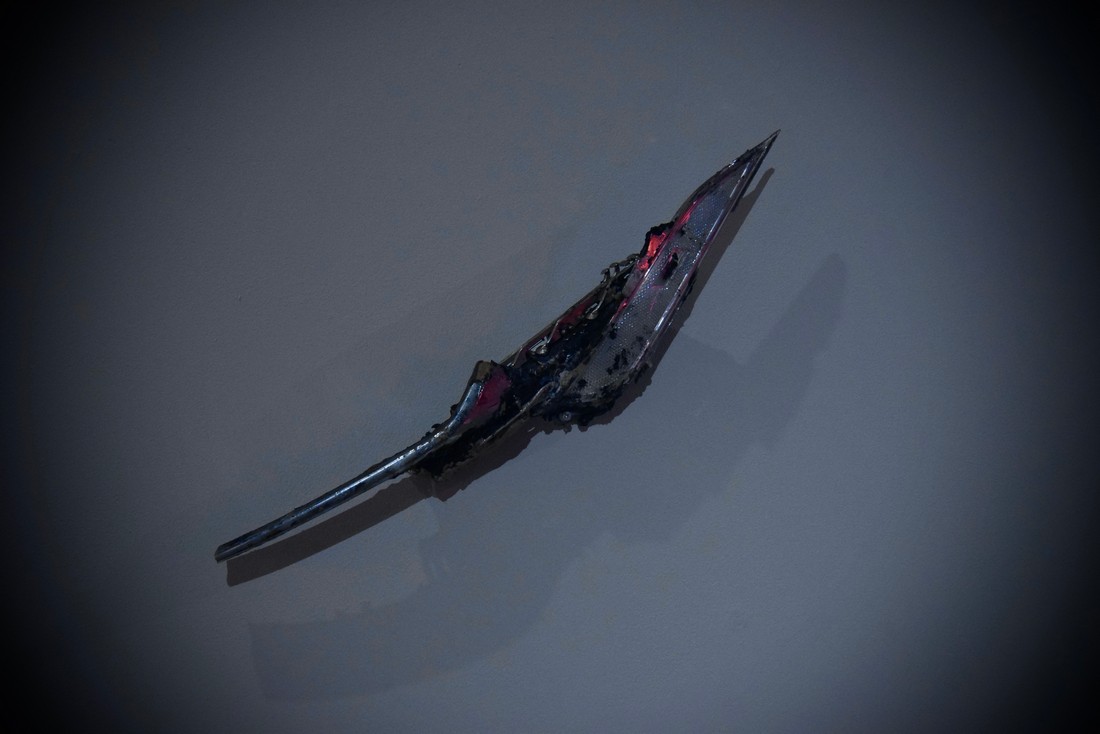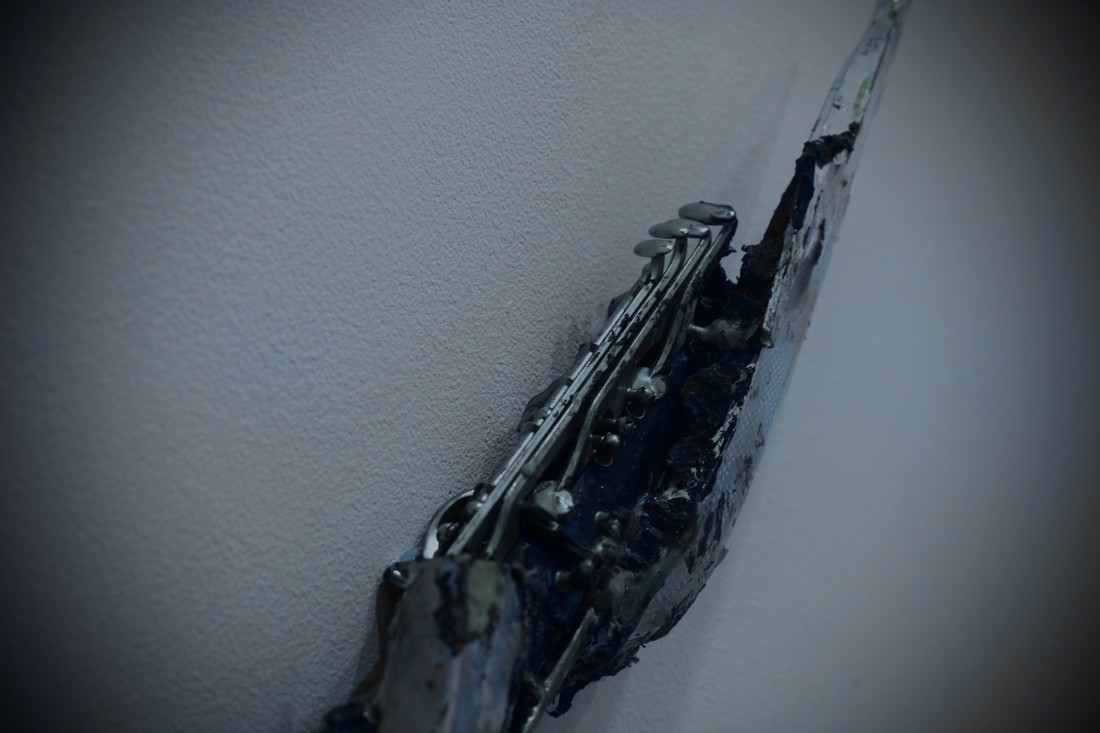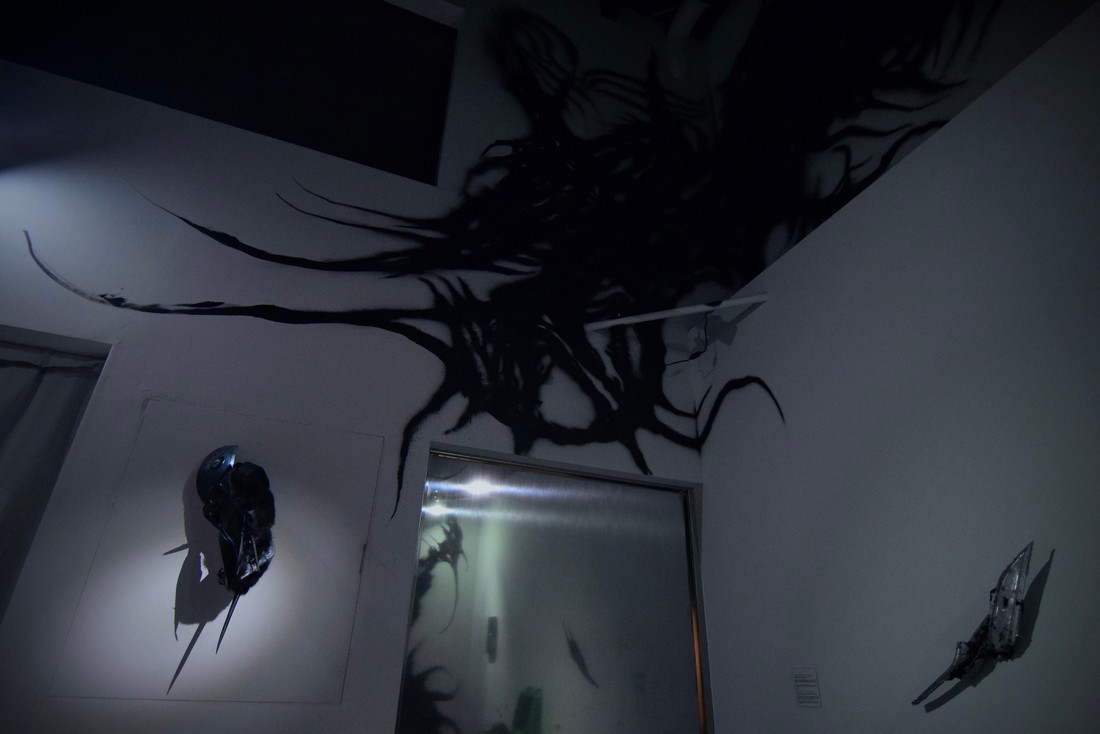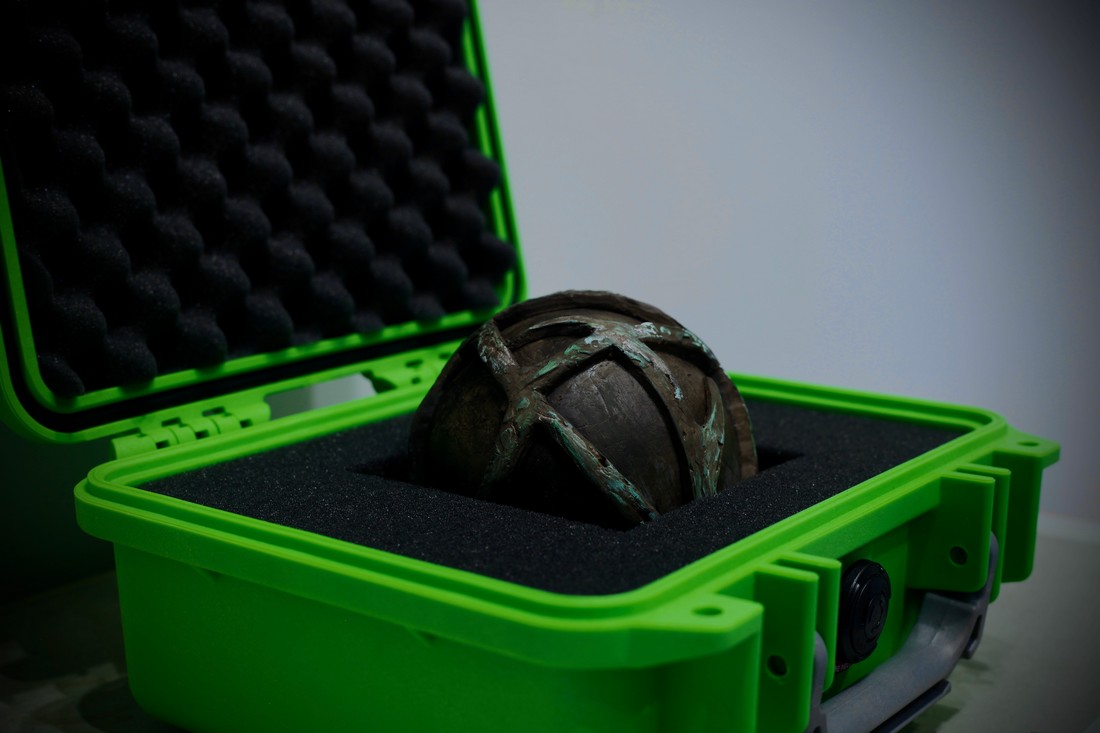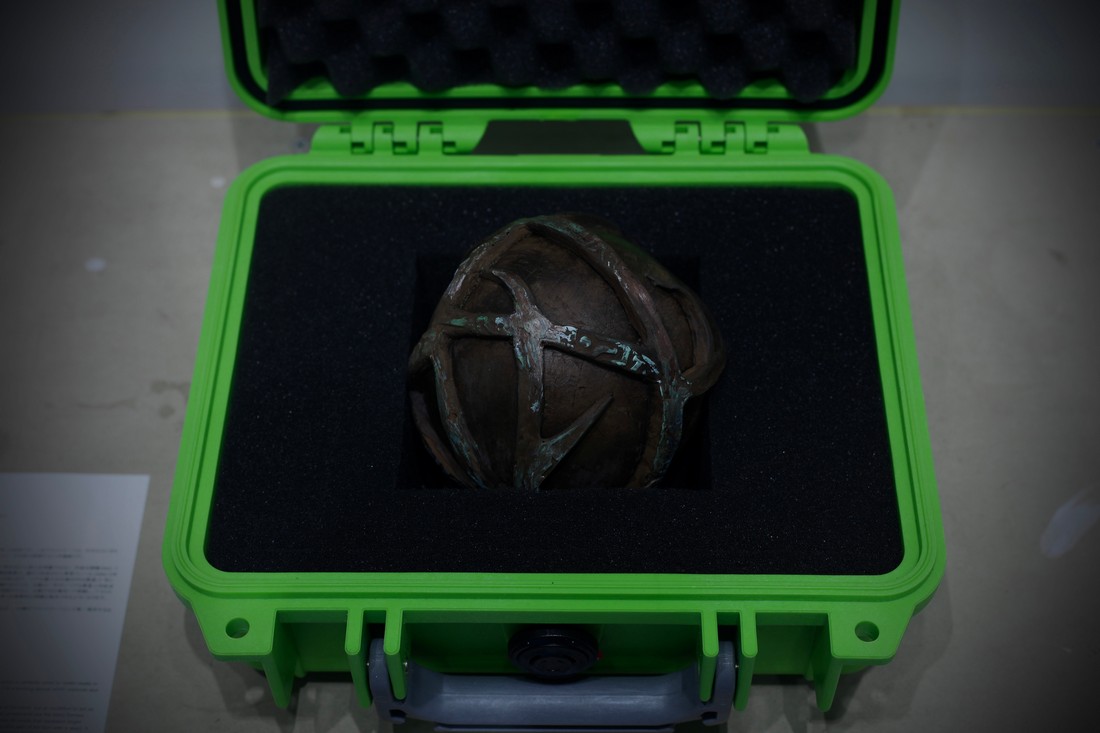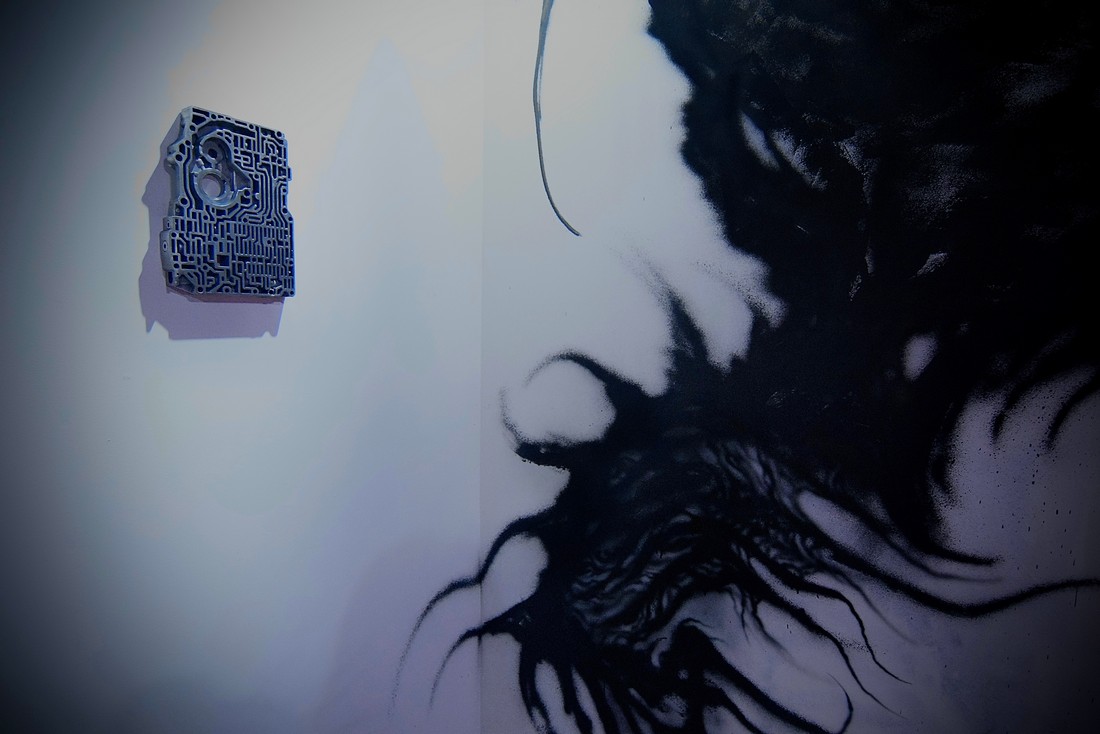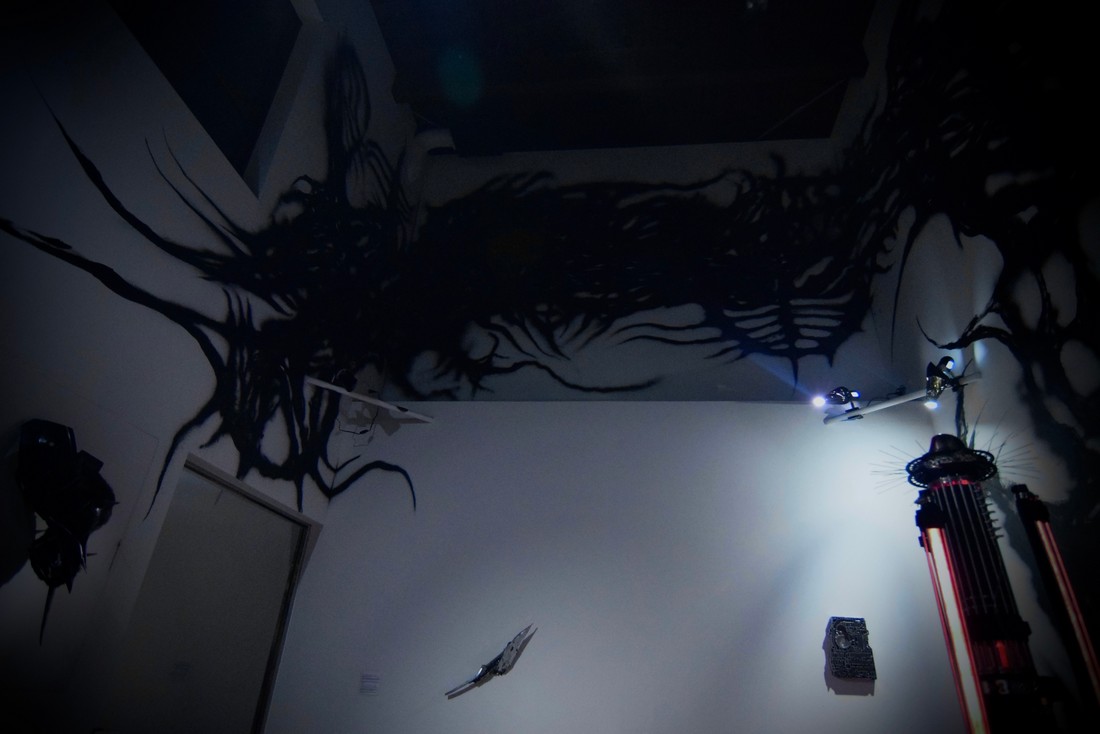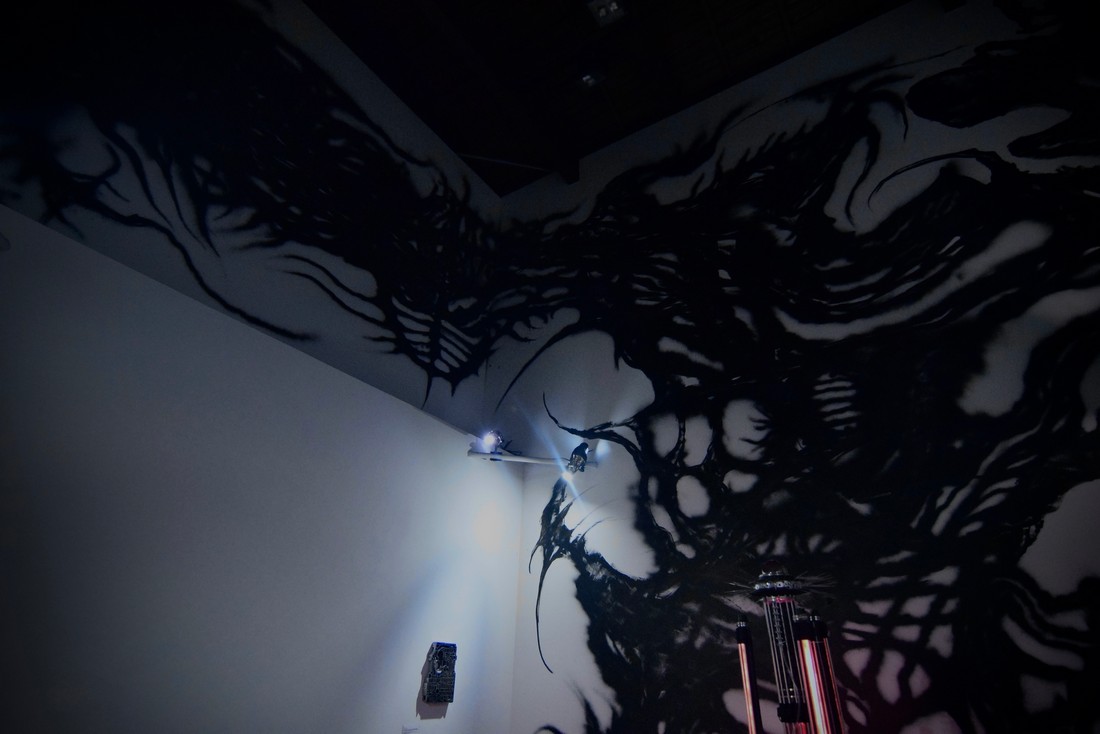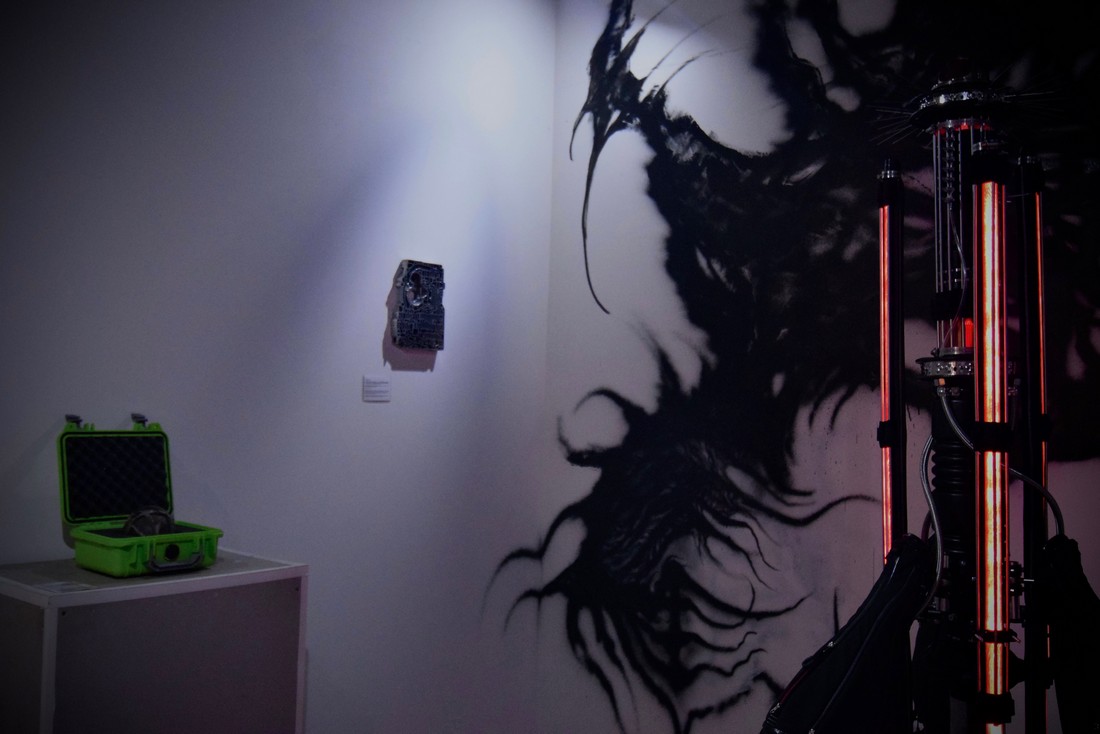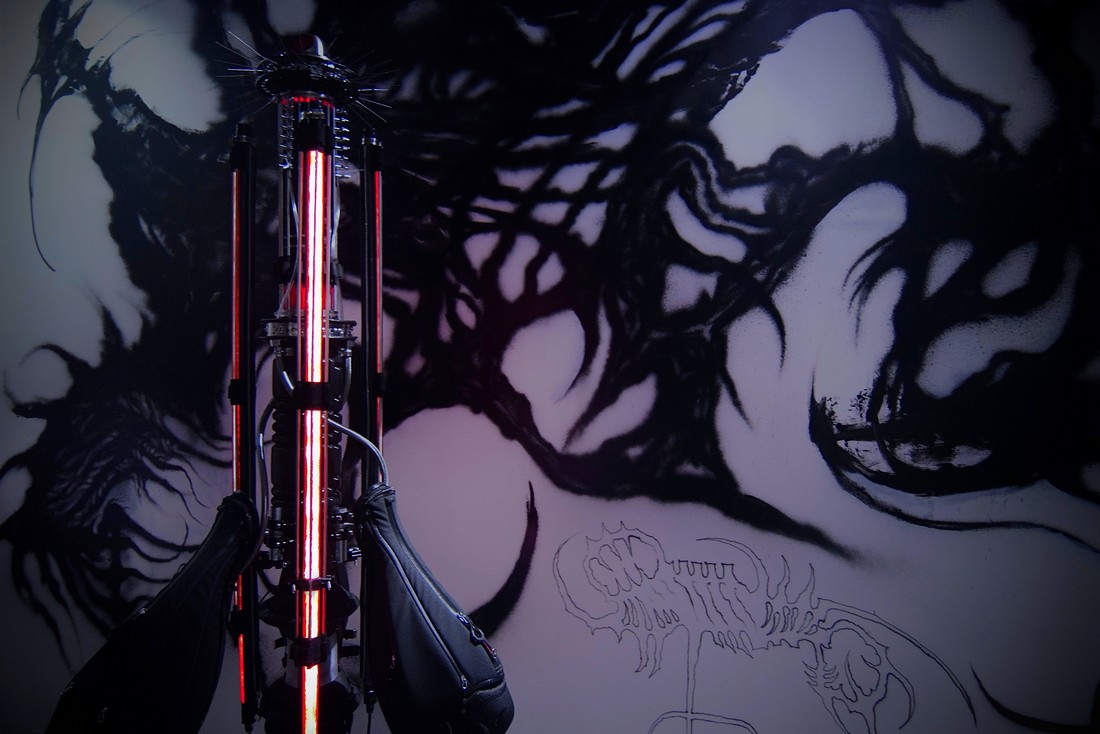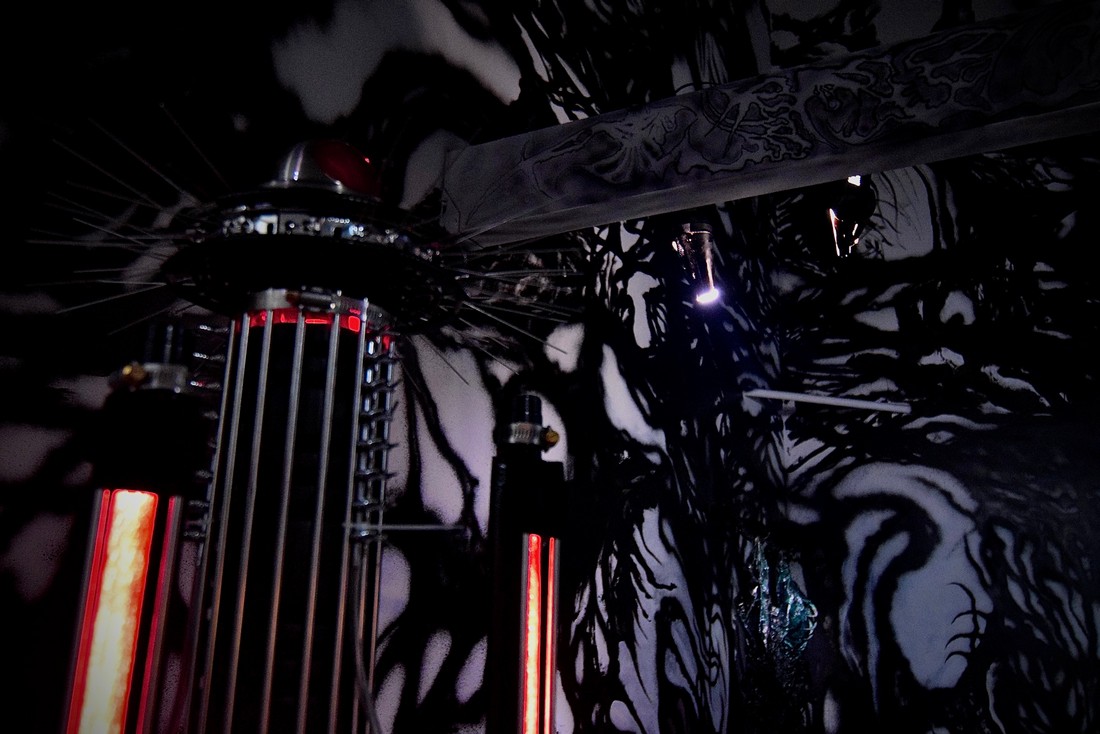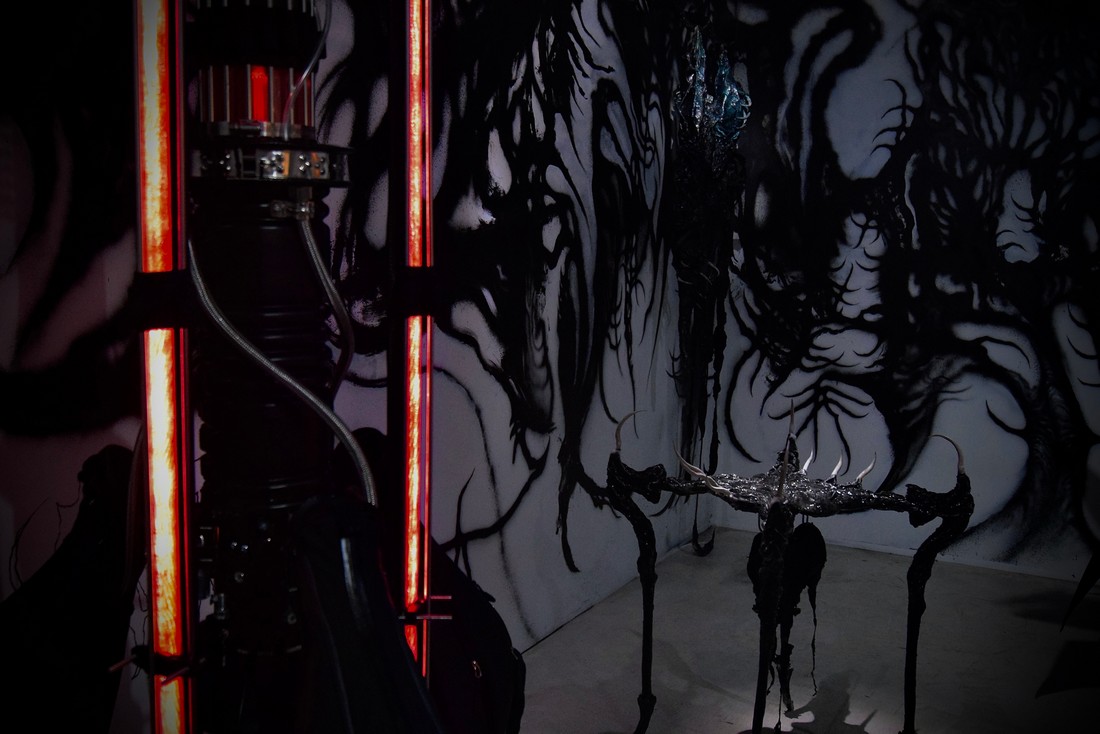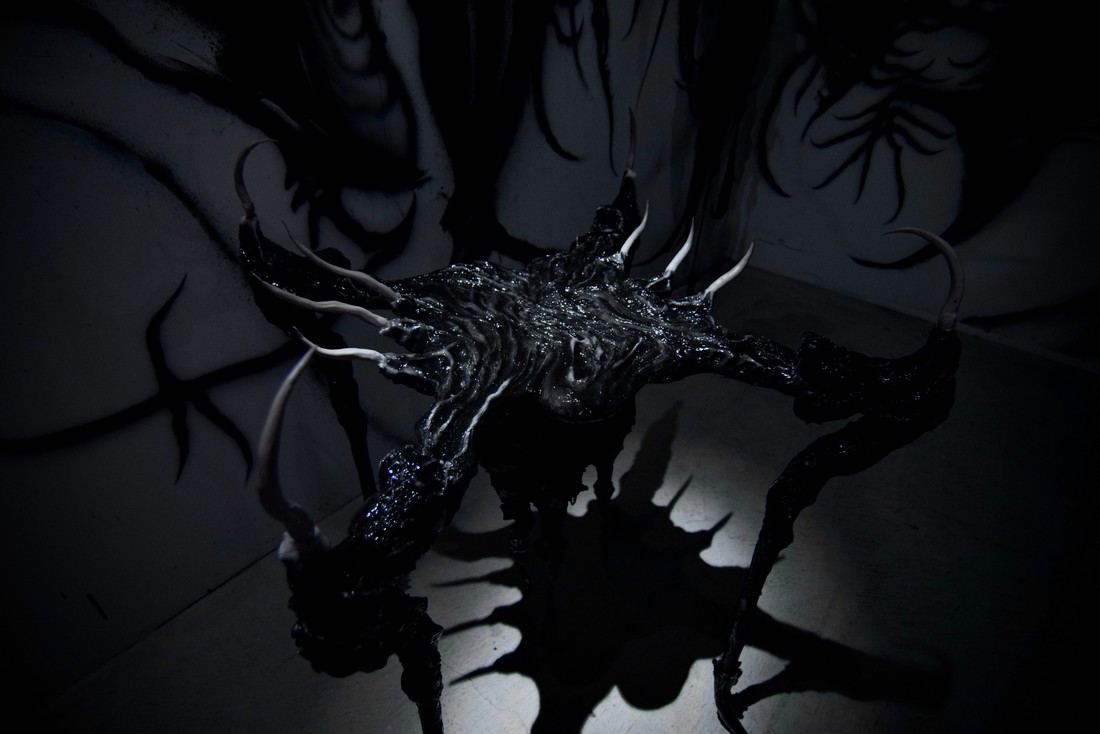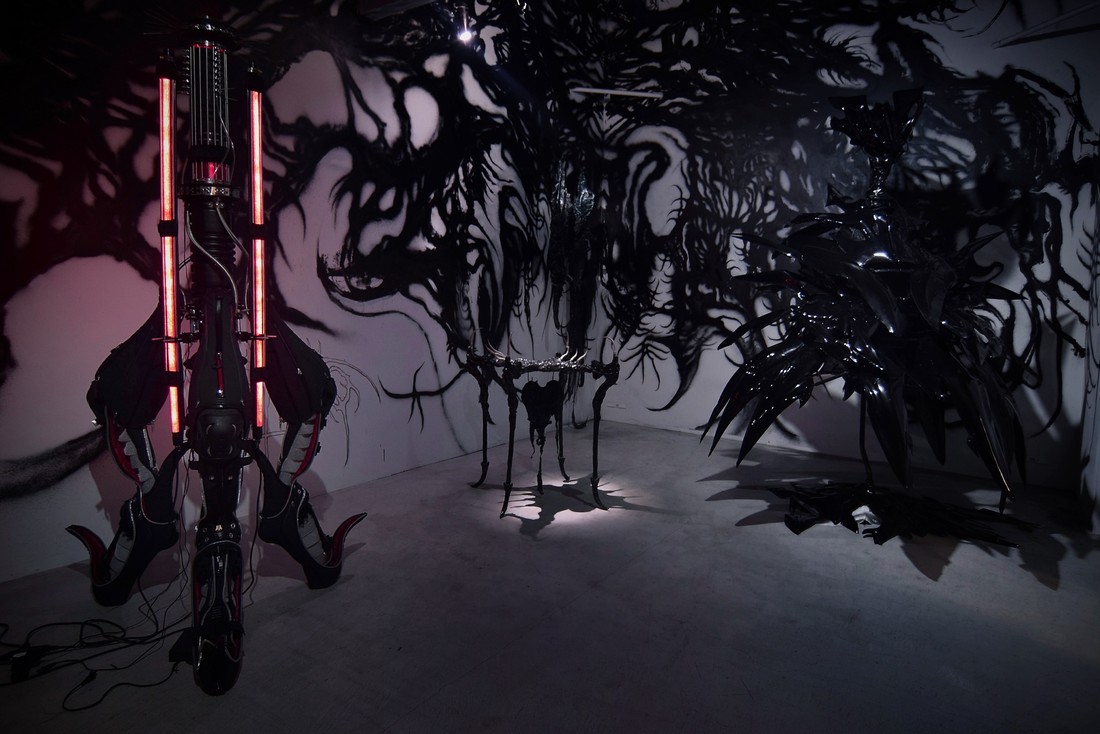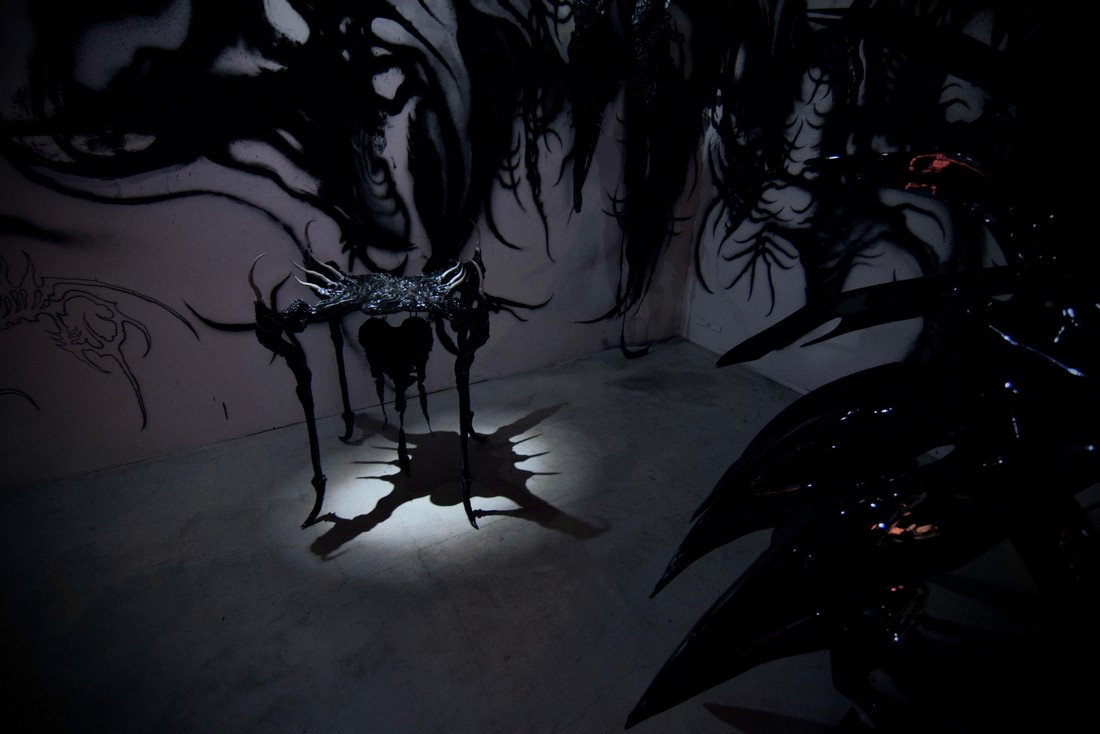
morgue | a group show | domicile tokyo
"The white box is anemic, sterile, boring. The black box is plethoric, rotting,
excited" ...
There is an extent to which it is blissful to be walled in. To see the sealed
space turning inside out, the convex walls of our encasement getting as wide
as possible while being as narrow as a blade, chopping us into a thousand
pieces.
Following the nature of the space, its possible, unbotheredly, to find comfort
in such constriction, or rather in such concision, pondering the depths of the
space: "Each portion of matter may be conceived as a garden full of plants,
and as a pond full of fish. But each branch of a plant, each limb of an animal,
each drop of its humours, is also such a garden or such a pond."
We dont see anything and yet images are appearing to us, as if we were in a
camera obscura, hallucinated by the nature of the sealed space itself.
Astonished by allegedly improbable quasi-hallucinations, the eyes are not
even open anymore, being persuaded by the space to see images that are not
even visible.
Little, very little concession to the outside world: a weak, pale light, from a
secret eye or a secret orifice.. Absence of light is as perfect as visions appear
drawing reality from darkness. Once settled, isolation is imperfectly complete
and we spend time trying to seal any leaks from the world outside so that the
leak is as sharp as a tormentous needle, making our brain stop craving the
world outside, "the way of squeezing ourselves through a narrow gate of
torment into this ever-new paradise of never escaping"
Wakeful states are seldom this "quiet", completely persuaded by the
environment that is being given to us. Being one thing among things. It is
customarily a lethargic state that we would grant to such a withdrawal. The
only difference is the effort, the commitment of forcing an even more perfect
alienation. As a result, we would eventually get obscure to ourselves, stuck in
a black box.
We wouldn't even know our own thoughts, we wouldn't sense our own self
perception. The black box: the only known thing is the outer aesthetic of the
box and the output of the encased process: exhaled breath, leaked fluids..
The raider approaches the corpse in silence, suspended between devotion and desire.
The entrance to the sepulchre feels like a sacred gate, nothing should trespass. Yet
desire is pushing the steps forward. The dungeon exudes a gloomy and decaying
atmosphere. The corpse lies on a large carved plinth, secreted in a sudarium. The
raider finally sees the craved pursuit. As the corpse stays secret, it doesnt go
unnoticed the corpse liquor, the cadaveric beverage that, leaking from the sudarium,
fills the grooves carved on the plinth. The liquor is of an uncanny power and the
rider, who seeks such power, after collecting some of the liquid in a cup, fervently
drinks.
[The historical practice of consuming fluids derived from deceased human bodies was rooted in the belief
that the fluids of a deceased person held mystical or curative properties. It was often associated with
attempts to harness the vitality or life force of the deceased individual, as well as with beliefs in the
transference of qualities or powers from the dead to the living. The corpse is here the black box itself]
The space is a compact perfect burial. Escapist thoughts are finally extinct.
Reaching perfection is delightful... Though.. waking up from the perfect
dream, one more mundane concession: an open door, curtains slightly ajar.
We surrender early to the dream of a perfect isolated cell, yet the room
somehow holds on the expression, the feeling of such a dream. The visual
potential has to be turned down, limited, letting the world in. In turn, there
has to be a point where the ones who visit leave outside their liveliness, their
wakefulness, to sense in turn the pristine isolated perfection.
"I lingered there, in the absolute prison of standing still."
To achieve perfect suspension, the first stage of hypersleep [as we might call
isolation from now on, for reasons to be clarified later], we first have to call
out the nature of space and defy how the content is contained, how the
content dwells, how the space holds on inside..
The black box is a secret as such, unknowable, lost forever. To be something
at all, the space has to set up a drama of the just before darkness, just before
the perfect hypersleep. A space in between realms, completely inaccessible
from each other. A place where dramatic twilights are permanent, where the
darkness looms but never lands.
The perfect/imperfect drama, to suspend/trigger a journey from the white
box towards the black box: a morgue. The content is fatally exhibited and
everything retains a relationship with the fashion that suits the morgue in the
best way.
Maybe there is time to wonder about these poorly enlightened corners, and
the unbalance of chaotic instances and sharp contrasts of an object within a
white cube. There is seldom time to wonder about it, except when in front of
our blurred eyes a drama takes shape.
Such exhibition is not an exhibition of the objects themselves, but of their
drama.
One of the purposes of the morgue seems to be related to descent. The space
feels heavy, like a pregnant dark cloud on the verge of releasing heavy acid
rain onto the world below. All the volumes linger on the surface of the floor,
waiting for more objects to join forces, making the space even heavier
downward.
The movement, the gravity, also functions backwards, from the realm of the
objects towards vague yet dramatic heights. "Below, matter is amassed."
Aligned to a domesticated dimension, objects are positioned, designed,
settled. They stand in relation with a space, lodging the mansion.
Verticality, heavy-handedly framed by dark clouds, drags the presence of the
objects upwards, as if this were a clumsy reenactment of an ascension.
There is the attempt of shifting the presence towards an absence. To give
absence some sort of presence. The objects are there, trying to enlighten the
escape energy towards a somewhere else.
Where can they go?
What if an object cannot be isolated and is no longer one? Or rather... what if
something inanimate happens to finally display volitions, desires... desires of
being one, seamlessly integrating with the environment, as if it were an
emergent state of its complexity... a desire for a less singular, univocal
individuation. Or the dissolution of that individuality in favor of becoming
the landscape.
These actors are not trained enough, so used in trying to stay relevant, so
sharply in dissonance - or in utter accord - to the flat white
background/perfect light of a gallery. In fact, this drama of objects
withdrawing from their own place, can't keep up with their lives. A morgue
is always a theatre of a dismemberment. The audience is there to see how it is
possible to dismantle a corpse.
At first, we don't even see corpses in a morgue. Everything is concealed, held
in suspension cases. They are suspended into the dramatic space in between
realms.
Objects silently fading into the landscape
𝕸𝖔𝖗𝖌𝖚𝖊
at Domicile Tokyo
Tokyo, April 14-19, 2023
by 011668, Ruben Ulises Rodriguez Montoya, runurunu, VVXXII, Yudai Ono
Flyer: VVXXII
Organized: runurunu
Press: Yoshiko Kurata
Support: Yoyogiparty Picnic
{back}
 morgue | a group show | domicile tokyo
morgue | a group show | domicile tokyo morgue | a group show | domicile tokyo
morgue | a group show | domicile tokyo